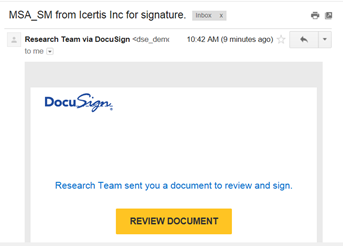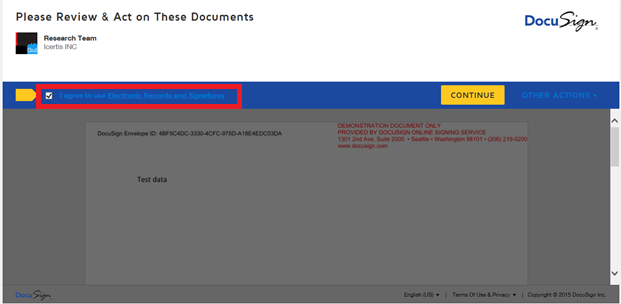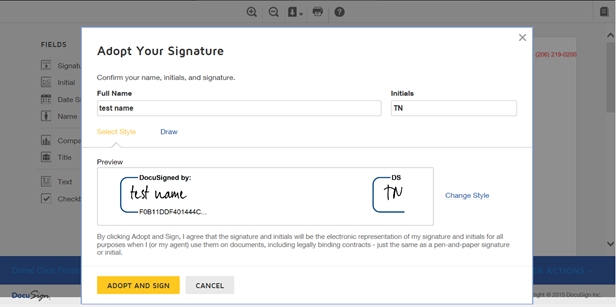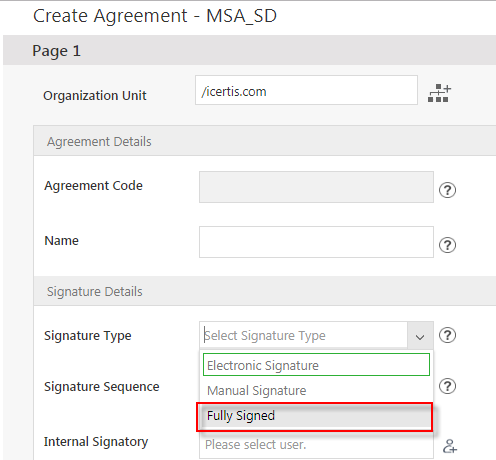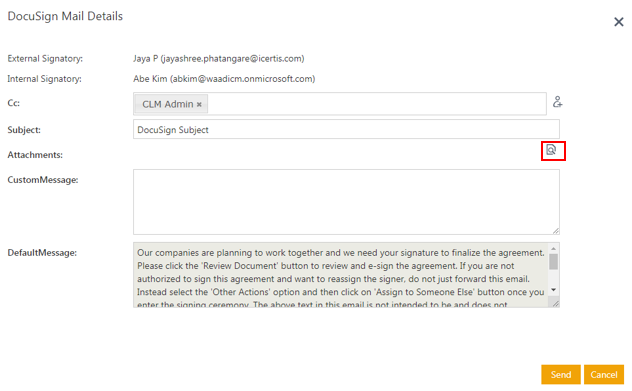Contents
Using Adobe Sign
Sending an Own Paper Agreement for Electronic Signature
Electronic signatures are done through Adobe Sign or DocuSign. External signatories can choose one of these applications if they wish to do electronic signatures. Refer to Sending an Agreement for Third Party Signature for details on sending the Agreement to external signatories.
To sign an Agreement electronically:
1. Open the e-mail you receive from Adobe Sign or DocuSign.
2. Click Review Document. The Please review & Act on These Documents window opens.
3. Select the I agree...check box and click Continue.This enables the Fields menu in the left panel.
Note: If you are using Internet Explorer, click Allow at the tracking physical location message. In the document, sender may mark few fields that appear with a text box next to the field name. Fill the appropriate information in appropriate text box. e.g. title, company.
4. Click Sign next to Signature. The Adopt Your Signature window is displayed if you are signing the document for the first time.
Note: If you have signed before, the system inserts the signature that you used when you signed for the first time.
5. Verify your Full Name, Initials, and Signature. Your Full Name and Initials appear as they are entered at the time of your user creation process.
Note: You cannot change the signature style once it appears on the document.
6. Click Finish. You receive a notification stating your signature process is completed. The status of the agreement changes to Waiting For Internal Signature. An e-mail is sent to the internal signatory.
Note: Internal Signatory can follow steps 1 to 9 to sign the Agreement electronically. Once signed, the status of the Agreement changes to Executed. A notification email is sent to the Primary Owner, Internal Signatory and External Signatory.
7. Verify your signature on the Select Style tab:
- Click Change Style to change the style of your signature and initials. This displays a list of alternate styles. Use scroll arrows to scroll through the signatures. Select from the list of styles.
- Alternatively, click the Draw tab to draw your own signature. Click Clear to clear the signature.
8. Click Adopt And Sign. The Signature and Initials appear on the document.
All Executed Agreements signed using Adobe Sign, include an audit log of key details in the signature flow, such as:
- The specific actions performed, such a document created, emailed, viewed and electronically signed
- Name of the user that performed these actions
- Time stamp of when those actions were completed
- IP address of the user that completed the actions
This feature is disabled by default and can be enabled from the Global Account Settings of Adobe Sign.
Sending an Agreement for Third Party Signature
After an Agreement is approved, the Primary Owner can send it for external signature.
Note: For the Agreements that are signed outside ICM, you can choose to skip the Signature workflow manually, by selecting the Fully Signed option from the Signature Type drop-down list on the Create Agreement page. This moves the Agreement from Approved to Executed state directly without clicking on the Send for Signature button. If there are approvers, the Agreement moves to Executed state after the last approver approves it. This option is available while creating Agreements, Assignments, Amendments, and Termination Agreements, if configured in the Contract Type.
External signatory can choose to sign the Agreement:
- Manually: the primary owner emails a PDF of the agreement to the external signatory. The signatory prints the document, signs it and emails back a scanned copy. The primary or secondary owners upload the signed copy of the agreement into ICM, at which point it's status becomes executed.
- Electronically: ICM uses Adobe Sign and DocuSign for electronic signatures.
To send an Agreement to an external signatory, click Send For External Signature in the Agreement Details Page. The External Signatory receives an email from Adobe Sign or Docusign in the following format:
The status of the Agreement changes to Waiting For External Signature.
Using DocuSign, ICM users can send the Associated documents along with the main Agreement for e-signatures so that the signatory can have all the information required to sign the Agreement at once.
Note: This feature is not supported by Adobe Sign.
Multi-Factor Authentication using Adobe Sign
ICM supports multi-factor authentication (MFA) for Adobe Sign customers at the Agreement level to ensure that select Agreements (such as high value and highly confidential Agreements) are only accessible to relevant users, as compared to only providing access based on the Name and Email address validation that was the case earlier.
The MFA authentication is configured by enabling the multi-factor flag. This results in ICM sending the signatory’s phone number to Adobe Sign for processing the e-signature authentication of the user for that Agreement. If the phone number for the signatory is not available, a message is displayed indicating that the phone number is mandatory and one or more of the signatory’s phone number is missing.
Note: When both – the password and the phone authentication are enabled for an Agreement, then the password authentication takes precedence.
To enable multi-factor authentication for an Adobe Sign customer:
1. Click theUser Administration tile.
2. Click the Users tile.
3. Click the Create User/Provision User (based on the user authorization to the instance) tile to open the Create User page.
4. On theDetails tab, enter the personal details of the user. The First Name, Last Name, Email Address, etc are mandatory fields.
5. In the Phone Number field, add the phone number of the user if you want to activate the authentication for the user.
6. Check the Consent Acknowledgment checkbox below By adding phone number,I confirm capturing user consent to receive important text messages from ICM to validate the user consent.
Note: This is not a mandatory field. However, it becomes mandatory to provide a phone number when the consent box is checked and vice-versa.
The phone number format needs to be in the Country Code-Phone Number. For example, 1-555-555-5555.
7. Enter the remaining details of the page as required and click the Create button. This opens the Users page enlisting the user that you created in the list.
Multi-factor authentication is validated using the phone number when:
- The Country Code-Phone Number format is incorrect.
- A signatory is added by Rule and the Agreement is sent for approval but the mandatory Phone Number field is blank. The Agreement will still be sent for approval and the workflow will continue after clicking OK on the validation message.
- A signatory is added by Rule and the Agreement is sent for external signature but the mandatory Phone Number field is blank. The Agreement will not be sent for signature and will remain in the approved state.
The two step authentication using Adobe Sign
When the Agreement is sent for external signature and when the two step authentication is configured, the external signatory receives authentication messages in two ways:
- A voice call
- An OTP code from ICM with an authentication code. On entering the code, the Agreement is sent for approval and workflow continues as expected.
Sending Associated documents for Signatures along with the main Agreement using Docusign
ICM allows the Primary Owner to select and attach individual copies of the Associated documents along with the main Agreement and send them for signatures via DocuSign, after adding the signatory tags. The Signatories can not only view but also sign these Associated Documents.
After signing, ICM generates the Version and History of the signed Parent Child Association and the main agreement by name of the last signatory. Parent Child Associations, which are not signed but are part of the DocuSign envelop are also synced.
Note: This feature does not support Peer Associations. .docx and PDF file types are supported.
To send the Associated documents for signature:
1. Click the Send for Signature button on Agreement's Details page. A Docusign Mail Details window opens. This option is available only if the DocuSign Associated Document attribute is configured at the Agreement Contract Type level.
2. Fill in the necessary details. Click the Attachment icon. The Send For signature window opens. This displays Association instances for Parent as well as peer association that contain the DocuSign Associate Documents script attribute.
3. Select the required associations from the list. The Signatories defined for the main Agreement are applicable for its Associated Documents too. Signatories can sign the Parent-Child type of Associations along with the main Agreement Document . If signature tags are not present in any of the Parent-Child Association, then signing is not mandatory.
After signing, Version and History of only the signed Parent Child Association and main Agreement is uploaded and generated with name of the last signatory.
The tags for Peer Association dont get render and the version doesn’t get synched back. Status of Parent Child Association does not change irrespective of the action taken by signatories. After the agreement is executed, only the signed copy of the Agreement gets uploaded.
Related Topics: Using DocuSign
